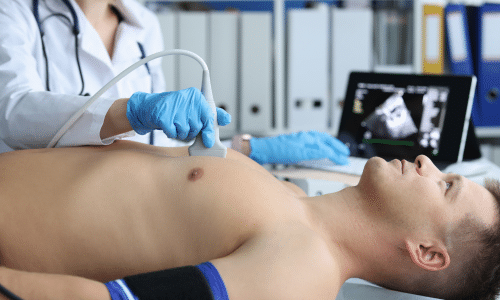Are you looking for a career in healthcare that combines technical skills with patient care? Consider enrolling in the Diagnostic Cardiac Sonography Program.
Our 95 weeks diploma program provides you with the knowledge and technical skills required to produce, evaluate, and diagnose sonographic images of the heart. This program offers you extensive clinical experiences, lab practice, and hands-on skills required to succeed in the field of Cardiac Sonography.
Graduates of this program may find employment as Cardiac Sonographers, Sonography Educators, Medical Technical Salespeople, Application Specialists, Medical Researchers, Managers, or Supervisors in related fields. But don’t just take it from us; ensure you graduate from an accredited program.
In the next sections, we will explore the essential knowledge and skills, followed by career opportunities in the field and the importance of graduating from an accredited program.
Program Details
95 Weeks Diagnostic Cardiac Sonography Diploma in BizTech College provides students with the essential theoretical knowledge and technical skills required to produce, evaluate, and diagnose sonographic images of the heart. With a focus on ultrasound technology, students learn the foundational scientific theory and physical principles of ultrasound, such as transducer beam formation, artifacts, and pulse echo instrumentation. They also gain a thorough understanding of sound waves and learn how to manipulate them to create images of the human heart.
Lab practice is an integral aspect of the program, enhancing students’ technical and interpersonal skills and enabling them to function as members of healthcare teams. Extensive clinical experiences provide students with hands-on field placements where they gain additional practical experience in patient management, assessment, and care. In addition, students acquire hands-on skills like suctioning and monitoring of vital signs and learn how to insert rectal tubes and document medical records appropriately.
With the successful completion of the program, graduates are eligible to write the national certification exams. This certification is crucial to becoming a registered diagnostic cardiac sonographer, which is necessary for working in the field. Graduates must also register with the College of Medical Radiation and Imaging Technologists of Ontario.
Overall, the Diagnostic Cardiac Sonography program offers students the knowledge, technical expertise, and essential skills required to become successful cardiac sonographers.
Career Opportunities in Cardiac Sonography
When it comes to career opportunities in Diagnostic Cardiac Sonography, graduating from an accredited program can open a lot of doors. The most obvious job title for graduates is that of a Cardiac Sonographer. But the opportunities don’t end there. Graduates may also find employment as Sonography Educators, Medical Technical Salespeople, Application Specialists, Medical Researchers, as well as Managers or Supervisors in related fields.
As a Cardiac Sonographer, you’ll be responsible for producing, evaluating, and diagnosing sonographic images of the heart. This means that you’ll have an instrumental role in the diagnosis and management of heart diseases, and every day you will be making a difference in people’s lives. As a Sonography Educator, you’ll be training the next generation of Cardiac Sonographers, ensuring that they have the same level of knowledge and expertise that you do. In sales or application support, you’ll be working with clients or healthcare providers to ensure that they have the tools they need to make accurate diagnoses and provide the best possible care.
Whether you’re interested in direct patient care or working behind the scenes in research or management, there are plenty of opportunities available to Diagnostic Cardiac Sonography graduates. With a competitive salary, the ability to work across Canada, and plenty of opportunities for networking, graduating from an accredited program is the first step towards a fulfilling career in this exciting and growing field.
Requirements for Becoming a Diagnostic Cardiac Sonographer
Becoming a Diagnostic Cardiac Sonographer requires registration with the College of Medical Radiation and Imaging Technologists of Ontario and passing the Sonography Canada Certification Examination. These requirements ensure that the sonographer has the necessary knowledge, skills, and competence to work safely and effectively in the healthcare field.
The registration process involves providing proof of education, completing an application form, and paying a fee. The College of Medical Radiation and Imaging Technologists of Ontario also requires sonographers to meet continuing education requirements to maintain their registration. This ensures that sonographers stay up-to-date with new developments and advancements in the field of diagnostic cardiac sonography.
Passing the Sonography Canada Certification Examination demonstrates that the candidate has met the national standards for competence in diagnostic cardiac sonography. The exam covers various areas, including anatomy and physiology, pathophysiology, and professional responsibilities.
Although becoming a diagnostic cardiac sonographer requires dedication and hard work, it can lead to a fulfilling career with many opportunities for growth and advancement. Plus, who wouldn’t want to spend their days helping diagnose and treat heart disease while getting paid a competitive salary?
Benefits of Graduating from an Accredited Program
Graduating from an accredited Diagnostic Cardiac Sonography program has many benefits. Firstly, it increases job opportunities as most employers prefer to hire graduates from accredited programs. Secondly, it allows you to work across Canada as recognized credentials are required to practice in this field. Thirdly, it offers competitive salaries as Diagnostic Cardiac Sonography is a highly specialized field. Lastly, it provides networking opportunities through alumni associations, conferences, and professional organizations.
In short, graduating from an accredited program sets you on a path to a fulfilling career, both in terms of monetary compensation and professional growth. So, why wait? Enroll in our college’s Accredited Diagnostic Cardiac Sonography program and be on your way to a bright future!

